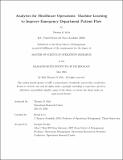Analytics for Healthcare Operations: Machine Learning to Improve Emergency Department Patient Flow
Author(s)
Kyle, Thomas D.
DownloadThesis PDF (14.96Mb)
Advisor
Levi, Retsef
Terms of use
Metadata
Show full item recordAbstract
Over the last several years, the Emergency Department (ED) at Massachusetts General Hospital (MGH) has been experiencing a significant increase in demand for hospital services. Overcrowding in the ED and high utilization of inpatient floors are symptoms of this increase in demand. Chapter 2 shows that data available at the time of an inpatient bed request can be used to prospectively identify ED patients who are sufficiently sick to require hospitalization, but are likely to be discharged within 2 nights of the admission decision. The resulting XGBoost classification model is being implemented as a decision support tool for clinicians who would be deciding whether to send this cohort of SS patients to a short-stay unit (SSU). The SSU would allow for more effective and timely care of this class of patients, thus helping to alleviate both ED overcrowding and inpatient floor utilization. The model exhibits an out-of-sample AUC of 0.81 and its scores are inversely correlated with the observed LOS as desired. Then, Chapter 3 investigates a generic service system that captures typical healthcare settings, in which a hospital has to manage bed assignment in the face of bed requests from patients with different characteristics. The service system (e.g., a hospital) must decide whether to accept or reject service requests instantaneously. The work describes an approximate dynamic programming approach to solve for admission control policies that consider LOS forecasts in admission decisions. The resulting LOS-considerate policy with perfect LOS forecasts allows the generic hospital to increase its daily revenue (or other value-
based metric) by 5.5% compared to a policy that does not consider LOS forecasts. This value added increases as the LOS forecasts become more accurate. This illustrates the benefits of using LOS forecasts in hospital resource allocation decisions and investment in accurate LOS forecasting.
Date issued
2024-05Department
Massachusetts Institute of Technology. Operations Research Center; Sloan School of ManagementPublisher
Massachusetts Institute of Technology